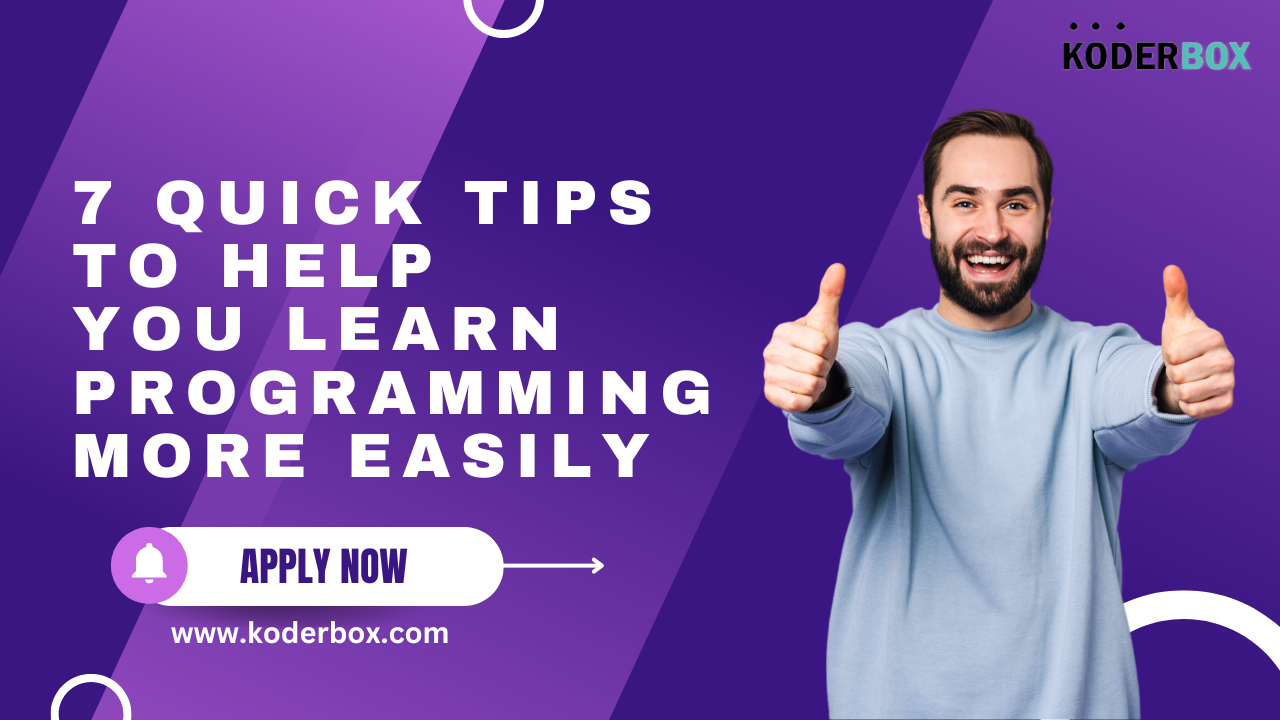What is the best way to learn programming quickly and pursue a career in it?” is a commonly asked question among students and language learners alike. Whether you’re a student, beginner, or an established professional looking to transition into the programming field, you’ll undoubtedly look for advice on how to pick up the skills you need to become proficient programmers fast. Programmers have some of the highest salaries available and also find that their professions are among the most interesting. For a beginners, learning and mastering the art of coding might take years. some quick and efficient ways to learn programming. It’s not an overnight journey, but it’s also not as hard as many assume; all you need is commitment, enthusiasm, a keen interest, and patience. It’s really easy, quick, and efficient to learn to code with the abundance of online and offline materials available. We will talk about several quick and efficient ways to learn programming.

1: Make Your Fundamentals Clear:
One of the most frequent mistakes made by students or beginners studying programming is to skip straight through chapter 1 and the foundations. You must have a firm grasp of programming basics in order to comprehend more complex programming concepts. If you keep making the same mistakes, you will eventually become very confused and will need to review your fundamentals. Data structures, variables, control structures, grammar, text editors, and tools are some examples of these foundations. When you initially start programming, choose a programming language, stay with it, and master the fundamentals before moving on to the next level. If you choose this route, you will undoubtedly save time when learning to code.
2: Learn by Doing, Practicing, and Not Just Reading:
When learning to program, one of the most frequent mistakes made by beginners is to read a book or look at sample code on their desktop without really doing it. Although it’s simple to read about loops and variables and picture everything in your brain, real programming isn’t done that way. It’s imperative that you practice coding on a daily basis and get your hands dirty. When you first start programming, you run into a lot of issues and become stuck. You’ll be asked to apply the code practically and solve a particular problem, and you’ll be scratching your brain the entire time.
Your ability to think logically becomes better every day as you write, play with, modify, and test alternative solutions for your code. Ultimately, you learn a great deal of things that help you become a better programmer. When you first start coding, practice the same code or sample repeatedly, or until you no longer use the book or other learning material. Additionally, create your own project, take part in code competitions, enjoy games with a coding theme, and practice coding on your own every day.
3: Code by Hand:
As a beginner programmer, you may wonder why you should write all of your own code. It takes a lot of time, and if I really need to implement something on my system, why should I use pen and paper when I can run and review my code on paper?
The interviews are one of the main causes. Most of the time, handwritten code will be part of the technical evaluation process when you apply for programming positions. You will need to utilize a whiteboard or a pen and paper to develop code. Although hand coding is an outdated method, it truly incorporates a test of a programmer’s ability. By hand-coding, you can develop a deeper mental link and gain a clear comprehension of grammar and algorithms. In the future, your work will be easier and faster if you learn programming using this method.
4: Share, Teach, Discuss and Ask for Help:
One of the best methods to quickly and simply grasp programming is to teach it. You can become a better programmer more quickly by teaching someone, sharing your knowledge, and participating in discussions with other programmers. Being able to teach someone else indicates that you have a thorough understanding of the material because you are learning it yourself as well. Learning something in-depth is the ideal habit to form, and you’ll find that you don’t need to revisit the subject. In addition, you can work on open-source projects, collaborate on GitHub, talk about your code with other programmers, and ask for assistance on forums and discussion websites.
Do not be afraid to ask for assistance when you are learning to program. This is a mistake made by beginners, who then feel awkward asking for assistance. In the long run, it will benefit you, and if you don’t do it, you will eventually struggle with coding. It doesn’t matter if you make dumb mistakes and appear foolish. To grasp things fast and readily, it is therefore a good idea to locate a mentor or ask other programmers for assistance. Because they have been in your position previously, your mentor or other professional can offer you greater advice.
5: Use Online Resources:
Numerous commercial and free internet resources are available. With the aid of these internet tools, you can begin learning to program. To learn to program quickly and efficiently, try coding boot camps or subscribe to YouTube channels. There are several resources on Koderbox for help and programming education. Develop the practice of reading blogs and online communities about programming as well.
6: Take Breaks:
It’s not a good idea to spend endless hours in front of a computer trying to learn everything at once if you want to learn programming. It is preferable to study coding in smaller doses because doing this will weary you. Take a few quick breaks to recharge. This is something else to have in mind when troubleshooting your code. It’s wise to take a quick break, clear your head, and do something different if you find yourself spending endless hours trying to identify the bug but still not being able to solve it in your code.
It will help you regain concentration, and you might solve the problem in your code where you were stuck. Additionally, make an effort to get rid of all distractions. To focus, turn off the notifications on your email and phone and try to spend some time alone. You’ll save headaches and frustration and save a ton of time by doing this.
7: Learning to Use Debugger:
In programming, coding errors are rather common and completely acceptable. Initially, there will be a lot of errors in your code, therefore it’s a good idea to utilize debuggers to identify faults, as well as how they affect your output and where you went wrong. Using a debugger or other tool to correct the flaws in your code will save you a ton of time. Acquiring expertise in debugging will facilitate learning to program. Hence, master effective debugging methods or employ tools to validate your code.
Conclusion:
Finally, we want to reassure you that learning to code is not that difficult and that you can always start out strong. Though it takes time and patience to think like a coder, you can learn it quickly if you follow the right path and are consistent. You might be thinking somewhere in the middle that you’re not smart enough to program. Take it step-by-step, start with the fundamentals, practice a lot, and once you have mastered the material, take on challenges and compete in programming contests on various websites to improve your skills, develop your logical reasoning, and develop your coder’s mindset. You will discover afterward just how proficient a coder you have become by practicing daily.
Good Luck and Happy Coding!!!
And why go anywhere else when our Koderbox Coding Guide helps you do this in a single program! Apply now to our Koderbox Program and our counsellors will connect with you for further guidance & support.
Website : www.koderbox.com
WhatsApp Us 📲 https://shorturl.at/cqwI1
Email: marketing@koderbox.com
#koderbox #Programming #LearnToCode #OnlineLearning #CodingSkills #ProgrammingEducation #TechEducation #OnlineCourses


